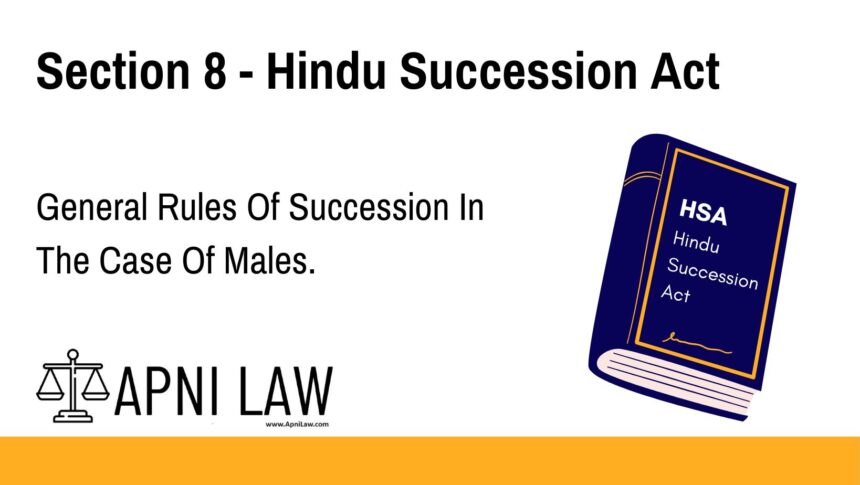Code: Section 8 – Hindu Succession Act
8. The property of a male Hindu dying intestate shall devolve according to the provisions of this Chapter:
(a) firstly, upon the heirs, being the relatives specified in Class I of the Schedule;
(b) secondly, if there is no heir of Class I, then upon the heirs, being the relatives specified in Class II of the Schedule;
(c) thirdly, if there is no heir of any of the two classes, then upon the agnates of the deceased; and
(d) lastly, if there is no agnate, then upon the cognates of the deceased.
Explanation of Section 8 – Hindu Succession Act
Section 8 of the Hindu Succession Act lays out the general rules for how the property of a male Hindu is to devolve in cases where the individual dies intestate (without a will). The devolution follows a specific order of preference based on a classification of heirs. These are:
- Class I Heirs: The primary heirs, as specified in Class I of the Schedule to the Act, have the first claim to the deceased’s property.
- Class II Heirs: If there are no heirs in Class I, the property will pass to the heirs listed under Class II of the Schedule.
- Agnates: In the absence of heirs from both Class I and Class II, the property will devolve upon the agnates (relatives related to the deceased through male lineage, e.g., paternal uncles, cousins).
- Cognates: Finally, if there are no agnates, the property will pass to the cognates (relatives related to the deceased through both male and female lineage, e.g., maternal uncles, cousins).
Illustration
Example 1: Class I Heirs
A male Hindu dies intestate, leaving behind his wife, children, and parents. According to Section 8, the property will devolve firstly upon the wife, children, and parents as they are the heirs in Class I.
Example 2: Class II Heirs
A male Hindu dies intestate, and there are no Class I heirs (no wife, children, or parents). The property will devolve secondly upon the Class II heirs (e.g., siblings, nieces, nephews).
Example 3: Agnates and Cognates
If a male Hindu dies intestate and there are neither Class I nor Class II heirs, the property will pass to his agnates (e.g., his father’s brothers, paternal cousins). If no agnates are available, the property will go to his cognates (e.g., his maternal cousins, maternal uncles).
Common Questions and Answers on Section 8 – Hindu Succession Act
1. Who are the heirs in Class I of the Schedule?
- Answer: Class I heirs include the wife, children (both sons and daughters), mother, and other immediate family members as specified in the Schedule.
2. What happens if there are no heirs in Class I?
- Answer: If no Class I heirs are present, the property will devolve upon the Class II heirs, which include siblings, nieces, nephews, and more distant relatives.
3. What are agnates and cognates?
- Answer: Agnates are relatives through the male line (e.g., paternal uncles, cousins), while cognates are relatives through both male and female lines (e.g., maternal uncles, cousins).
Conclusion
Section 8 of the Hindu Succession Act establishes a clear order for the devolution of property when a male Hindu dies intestate. The hierarchy begins with Class I heirs, followed by Class II heirs, agnates, and finally, cognates, ensuring a fair distribution based on familial relationships.








